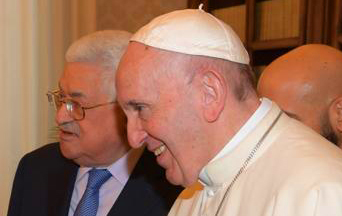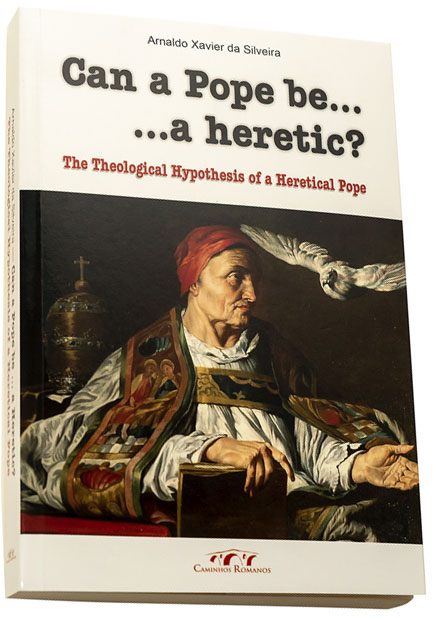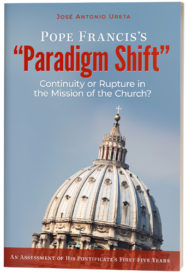
“The Pluralism and the Diversity of Religions … Are Willed by God”
The Document on Human Fraternity signed by Pope Francis during his Apostolic Journey to the United Arab Emirates (February 3-5, 2019) contains statements that are “directly contrary to the Catholic faith.”1 This has serious theological and canonical implications.
Pope Francis co-signed the document with the imam of the Al-Azhar Muslim University, in Cairo, Egypt, on February 4.
God Cannot Want False Religions
The declaration, titled A Document on Human Fraternity for World Peace and Living Together,2 contains the usual rhetorical statements devoid of practical application, typical of this type of document. However, it also contains numerous doctrinal errors and inaccuracies. Given its gravity, we will focus on the following proposition that formally contradicts Catholic doctrine: “The pluralism and the diversity of religions…are willed by God in His wisdom.”
Eternal and Natural Law: The Foundation of Morals and Law
God cannot want the existence of false religions because He cannot want both truth and error, good and evil. If that were so, He would be a contradictory being, and a contradictory being cannot be God, Who is eternal Wisdom, supreme truth, and goodness.3
It would be absurd if God willed a Trinitarian religion like the Catholic and at the same time an anti-Trinitarian one like Islam, modern Judaism, or, for that matter, religions like Buddhism and Animism that do not even believe in a personal God. To give just two examples of incompatibility between the one true religion and the many false ones: God cannot approve monogamy and polygamy, divorce and the indissolubility of marriage simultaneously.
Both human reason and divine Revelation reject contradiction in God: “Thou shalt not have strange gods before me” (Ex. 20:3).
The reason that God allows the existence of false religions and other evils is not because He wishes them. In his encyclical Libertas Praestantissima, Pope Leo XIII explains clearly:
“God Himself in His providence, though infinitely good and powerful, permits evil to exist in the world, partly that greater good may not be impeded, and partly that greater evil may not ensue.”4
“Repudiation of the Catholic Faith”
Dr. John Lamont gives an incisive title to his analysis of the Abu Dhabi declaration, “Francis and the Joint Declaration on Human Fraternity: A Public Repudiation of the Catholic Faith.” He argues that “taken in its normal meaning, the statement that the pluralism and diversity of religions is willed by God in his wisdom is directly contrary to the Catholic faith. The pluralism and diversity of religions is an evil, and as such cannot be willed by God.”
Concluding his analysis, Dr. Lamont writes: “This statement by Pope Francis is thus a clear, public repudiation of the Catholic faith. It follows a series of other more or less clear and public repudiations of this kind. Enough has been said about this rejection of the faith; it is time that something was done about it.”5
“A Pope Automatically Loses His Petrine Office When Professing Heresy”
Prof. Joseph Seifert was no less incisive in his assessment. As a philosopher, he shows the logical absurdity of the statement signed by Pope Francis: “In fact, if God really ‘wills all religions,’ then he must hate the Catholic Church most of all because of its claim to be the one, Catholic, and apostolic Church and because it rejects in its dogmas and perennial magisterial teachings any relativization of the Christian religion which would turn Christianity into one of many contradictory religions.”6
Prof. Seifert also states that if Pope Francis does not recant this declaration, he can be considered a heretic and, as such, lose the papacy:
Therefore, we have all good reason to hope that Pope Francis will revoke a sentence that constitutes a total break with logic as well as with Biblical and Church teaching.
If he does not do this, I am afraid that Canon Law may apply according to which a Pope automatically loses his Petrine office when professing heresy, especially when he professes the sum total of all heresies.7
Nothing in Revelation Prevents a Pope From Professing Heresy
The possibility of a pope professing heresy, as mentioned by Prof. Seifert, is not new, as readers unfamiliar with the subject may imagine. The theological hypothesis of a heretical Pope is found in the theological and canonical tradition of classical authors such as Cajetan, Suarez, Saint Robert Bellarmine, Billot, Ballerini, Wernz-Vidal, and others.
This hypothesis was brought up again by Prof. Arnaldo Xavier da Silveira in a book recently published in English: Can a Pope be…a heretic? − The Theological Hypothesis of a Heretical Pope.8
 Learn All About the Prophecies of Our Lady of Good Success About Our Times
Learn All About the Prophecies of Our Lady of Good Success About Our Times
Having studied more than a hundred renowned authors, including two Doctors of the Church (Saints Robert Bellarmine and Alphonsus Liguori), the author concluded that there is nothing in Revelation that asserts the impossibility of a pope falling into heresy when he does not teach ex cathedra.
Following Saint Robert Bellarmine, Wernz-Vidal, Ballerini and others, Xavier da Silveira states that once the pope’s heresy becomes public and notorious, known to the faithful, he loses his office ipso facto, that is, by the very fact of professing heresy.
Saint Robert Bellarmine: “The Pope Manifestly a Heretic Ceases by Himself to Be Pope”
Let us quote an excerpt from this work by Saint Robert Bellarmine: “[T]he Pope manifestly a heretic ceases by himself to be Pope and head [of the Church], in the same way as he ceases to be a Christian and a member of the body of the Church; and for this reason he can be judged and punished by the Church. This is the opinion of all the ancient Fathers, who teach that manifest heretics lose immediately all jurisdiction.”9

The Doctor of the Church explains that someone who has ceased being a member of the Church, because of manifest heresy, cannot be its head: “Now, he who is not a Christian is not a member of the Church, and a manifest heretic is not a Christian, as is clearly taught by Saint Cyprian (lib. 4, epist. 2), Saint Athanasius (Ser. 2 cont. Arian.), Saint Augustine (lib. de grat. Christ. cap. 20), Saint Jerome (cont. Lucifer.) and others; therefore, the manifest heretic cannot be Pope.”10
Earlier, Saint Robert Bellarmine observed that “the argument for authority is based on Saint Paul (Epist. ad Titum, 3) who orders that the heretic be avoided after two warnings, that is, after showing himself to be manifestly obstinate—which means before any excommunication or judicial sentence.”11
Not a Deposition but an Abdication, a Tacit Resignation
Xavier da Silveira explains: “For the Jesuit Saint, no one deposes the Pope, but he himself leaves the visible Church upon manifesting his heresy. Hence, he loses the Pontificate even if he remains in the Apostolic Palaces and tries to keep both his post and Church governance. This is an abdication, a tacit resignation, for to renege the Faith is an act incompatible with the Papacy.”12
Who Could Issue the Pope the Warning of Which Saint Paul Speaks?
According to Pietro Ballerini (1698-1769), an eminent Italian theologian, since this warning is not an act of jurisdiction (juridically, no one is above the pope so no one can judge him), but rather one of charity, anyone can do it, even a layman, for “any subjects can, by fraternal correction, warn their superior” since “for any person, even a private person, the words of Saint Paul to Titus hold: ‘Avoid the heretic.’”13
It is well to recall that not only spoken or written words, but also “acts, gestures, attitudes and omissions can characterize a heretic.”14
How This Position Differs From Sedevacantism
According to Xavier da Silveira, the main error of sedevacantists is that they decide that the Holy See is vacant without taking into account the necessary steps recommended by theologians to arrive at this conclusion and, above all, “without paying attention to the principle that in a visible and perfect society such as the Church, the fundamental facts of its life such as the acquisition or loss of leadership must be known to the social body.”15 In other words, by her visibility, the Church requires both the election and resignation of a pope be public enough to become known to the common faithful.
On the other hand, it is necessary to keep in mind the principle enunciated by Saint Alphonsus Liguori that as long as a pope enjoys the universal acceptance of the clergy and the faithful, he continues to hold office. In such a case, the See of Peter is not vacant.16
Francis’s Silence vis-à-vis Accusations
It would take too long to mention all interpellations or requests for clarification made to Pope Francis and which he refused to address. Avoiding any mention of their authors, he accused them of being hypocrites, “Doctors of the Law,” “Pharisees,” “Pelagians,” and so on.17
10 Razones Por las Cuales el “Matrimonio” Homosexual es Dañino y tiene que Ser Desaprobado
Let us recall only two of these interpellations or requests for clarification. On September 19, 2016, four cardinals−Walter Brandmüller, Raymond L. Burke, Carlo Caffarra, and Joachim Meisner−sent the pope five questions called dubia (Latin for “doubts”) asking him to clarify statements contained in the Apostolic Exhortation Amoris Laetitia that are opposed to Catholic doctrine.18 Then, on July 16, 2017, forty-five Catholic scholars (250 in the final signature count) published a Correctio filialis de haeresibus propagatis, in which they identified seven statements contained in Amoris Laetitia as false and heretical.

Purchase the Book here (Free Shipping).
One wonders whether Pope Francis’s failure to give a clear and direct response to these doctrinal initiatives, even as he continues making statements incompatible with the Catholic Faith and Church tradition, does not leave him in a rather uncomfortable situation regarding his orthodoxy.
The fact that he shows no concern for being seen as a heretic despite the scandal that it causes leads many to wonder whether he already finds himself in the heretic pope situation examined by Saint Robert Bellarmine and so many other ancient and recent theologians.
Hence, one understands the question Prof. Joseph Seifert raises: “I am afraid that Canon Law may apply according to which a Pope automatically loses his Petrine office when professing heresy, especially when he professes the sum total of all heresies.”19
The question has been raised and must be debated.
Footnotes
- John Lamont, “Francis and the Joint Declaration on Human Fraternity: A Public Repudiation of the Catholic Faith,” Rorate Caeli, Feb. 10, 2019, https://rorate-caeli.blogspot.com/2019/02/guest-article-francis-and-joint.html.
- “A Document on Human Fraternity for World Peace and Living Together,” Feb. 4, 2019, http://w2.vatican.va/content/francesco/en/travels/2019/outside/documents/papa-francesco_20190204_documento-fratellanza-umana.html.
- Saint Thomas Aquinas: “Whence it follows not only that truth is in Him [God], but that He is truth itself, and the sovereign and first truth.” Summa Theologiae, I, Q. 16, a. 5; “To be good belongs pre-eminently to God,” ibid., Q. 6, a. 2. (All emphases in this article are mine.)
- Leo XIII, Encyclical Libertas praestantissima, Jun. 20, 1888, no. 33, http://w2.vatican.va/content/leo-xiii/en/encyclicals/documents/hf_l-xiii_enc_20061888_libertas.html.
- John Lamont, “Francis and the Joint Declaration on Human Fraternity: A Public Repudiation of the Catholic Faith,” Rorate Caeli, Feb. 10, 2019, https://rorate-caeli.blogspot.com/2019/02/guest-article-francis-and-joint.html.
- Josef Seifert, “Grave Concerns About Pope Francis’ Abu Dhabi Document,” Gloria.TV, Feb. 8, 2019, https://gloria.tv/article/FL9X8LzsDd8v4yYN39TCeEsrM.
- Ibid.
- Prof. Arnaldo Xavier da Silveira’s study was first published in Portuguese in 1970 as the First Part of the book, Considerações sobre o Ordo Missae de Paulo VI. It was subsequently expanded by delving deeper into fundamental topics and published in France in 1975 as Part Two of the book titled, La nouvelle messe de Paul VI: qu’en penser? (Diffusion de la Pensée Française). Later, with an even more explicit discussion on fundamental topics, it was published in Italy as a single book under the title Ipotesi teológica di un papa eretico (Edizioni Solfanelli, 2016); with further developments, an English edition was then published in Europe, titled Can a Pope Be… a Heretic? The Theological Hypothesis of a Heretical Pope, trans. John Spann (Portugal: Caminhos Romanos, 2018). John Salza and Robert Siscoe dealt with the subject in their book True or False Pope? Refuting Sedevacantism and other Modern Errors (Winona, Minn.: STAS Editions, 2015).
- Saint Robert Bellarmine, De Rom. Pont., lib. II, cap. 30, 420, quoted in Arnaldo Xavier da Silveira, Can a Pope be…, 82.
- Xavier da Silveira, Can a Pope be…, 77.
- Ibid.
- Ibid., 110. (Bold in the original.)
- Ibid., 85.
- See Arnaldo Vidigal Xavier da Silveira, Can Documents of the Magisterium of the Church Contain Errors? Can Catholic Faithful Resist Them? (Spring Grove, Penn.: The American Society for the Defense of Tradition, Family and Property – TFP, 2015), pp. 47-72.
- Xavier da Silveira, Can a Pope be…, 119–20.
- See Ibid., 118-9.
- Some of Pope Francis’s common insults can be found on the blog, Pope Francis’ Little Book of Insults, http://popefrancisbookofinsults.blogspot.com/.
- See Edward Pentin, “Full Text and Explanatory Notes of Cardinals’ Questions on ‘Amoris Laetitia’,” National Catholic Register, Nov. 14, 2016, http://www.ncregister.com/blog/edward-pentin/full-text-and-explanatory-notes-of-cardinals-questions-on-amoris-laetitia.
- Josef Seifert, “Grave Concerns About Pope Francis’ Abu Dhabi Document,” Gloria.TV, Feb. 8, 2019, https://gloria.tv/article/FL9X8LzsDd8v4yYN39TCeEsrM.

